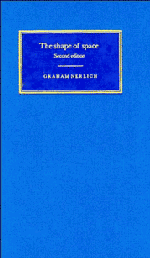Book contents
- Frontmatter
- Contents
- Preface
- Introduction
- 1 Space and spatial relations
- 2 Hands, knees and absolute space
- 3 Euclidean and other shapes
- 4 Geometrical structures in space and spacetime
- 5 Shapes and the imagination
- 6 The aims of conventionalism
- 7 Against conventionalism
- 8 Reichenbach's treatment of topology
- 9 Measuring space: fact or convention?
- 10 The relativity of motion
- Bibliography
- Index
1 - Space and spatial relations
Published online by Cambridge University Press: 04 December 2009
- Frontmatter
- Contents
- Preface
- Introduction
- 1 Space and spatial relations
- 2 Hands, knees and absolute space
- 3 Euclidean and other shapes
- 4 Geometrical structures in space and spacetime
- 5 Shapes and the imagination
- 6 The aims of conventionalism
- 7 Against conventionalism
- 8 Reichenbach's treatment of topology
- 9 Measuring space: fact or convention?
- 10 The relativity of motion
- Bibliography
- Index
Summary
Pure theories of reduction: Leibniz and Kant
Two great men stand out among those philosophers who have wished to exclude space from their list of things really in the world. They are Leibniz and Kant. Each man held views at some time which differed sharply from views he held at others. To take our bearings in the subject, let us begin by giving an outline of one theory which we owe to Leibniz's Monadology and New System (1973) another which we owe to Kant's Critique of Pure Reason and a third which we owe to Leibniz's letters to Samuel Clarke, a defender of Newton in the great seventeenth-century debate on mechanics.
Leibniz's argument in the Monadology is not epistemological but purely metaphysical. It is about communication of influences among substances, and so about their causal and spatial relations. He was convinced that anything real must be a substance or its accident; that is, reality is comprised in things and intrinsic properties of things. Any apparent relation is either really an intrinsic aspect of a thing or it is nothing. Clearly enough, space and spatial relations are going to pose a problem.
Leibniz's profound and elegant theory shows how to rid his ontology of space. Everything revolves round one nuclear idea: nothing mental can be spatial. Mind and mental attributes are a model for what is real but unextended. So Leibniz can regard the world as non-spatial if he can account for it all by regarding it as mental. This is an astonishingly bold and penetrating idea. It is worked out along these rough lines. Everything there is must be a monad, an unextended mindlike substance.
- Type
- Chapter
- Information
- The Shape of Space , pp. 11 - 43Publisher: Cambridge University PressPrint publication year: 1994

